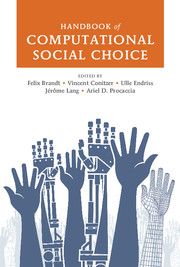Crossref Citations
This Book has been
cited by the following publications. This list is generated based on data provided by Crossref.
Pazdera, Jaroslav
Schumacher, J. M.
and
Werker, Bas J. M.
2013.
Intra-Group Risk Sharing Under Financial Fairness.
SSRN Electronic Journal,
Bennett Moses, Lyria
Goré, Rajeev
Levy, Ron
Pattinson, Dirk
and
Tiwari, Mukesh
2017.
Electronic Voting.
Vol. 10615,
Issue. ,
p.
66.
Misra, Neeldhara
Sonar, Chinmay
and
Vaidyanathan, P. R.
2017.
Algorithmic Decision Theory.
Vol. 10576,
Issue. ,
p.
124.
Neves dos Reis, Wallace Pereira
and
Bastos, Guilherme Sousa
2017.
An Arrovian view on the multi-robot task allocation problem.
p.
290.
Boccard, Nicolas
2017.
Social Indicators of Wellbeing.
SSRN Electronic Journal,
Wilde, Vishal
2017.
Improving Candidate-Quality Preference-Specification Mechanisms: Incorporating (Gender-Empowering) Voter-Chosen Quotas into a More Holistic and Democratically-Just Voting System.
SSRN Electronic Journal ,
Vigneron, Vincent
and
Duarte, Leonardo Tomazeli
2017.
Latent Variable Analysis and Signal Separation.
Vol. 10169,
Issue. ,
p.
192.
Aronshtam, Lior
Cohen, Havazelet
and
Shrot, Tammar
2017.
Tennis manipulation: can we help serena williams win another tournament?.
Annals of Mathematics and Artificial Intelligence,
Vol. 80,
Issue. 2,
p.
153.
Kokorakis, Vasileios Manousakis
Petridis, Miltos
and
Kapetanakis, Stelios
2017.
Artificial Intelligence XXXIV.
Vol. 10630,
Issue. ,
p.
47.
Alechina, Natasha
van der Hoek, Wiebe
and
Logan, Brian
2017.
Fair decomposition of group obligations.
Journal of Logic and Computation,
Vol. 27,
Issue. 7,
p.
2043.
Brandt, Felix
Brill, Markus
Seedig, Hans Georg
and
Suksompong, Warut
2018.
On the structure of stable tournament solutions.
Economic Theory,
Vol. 65,
Issue. 2,
p.
483.
Baert, Quentin
Caron, Anne-Cécile
Morge, Maxime
and
Routier, Jean-Christophe
2018.
Fair multi-agent task allocation for large datasets analysis.
Knowledge and Information Systems,
Vol. 54,
Issue. 3,
p.
591.
Endriss, Ulle
and
Grandi, Umberto
2018.
Graph Aggregation.
p.
447.
2018.
Strategic Voting.
Reitzig, Raphael
and
Wild, Sebastian
2018.
Building Fences Straight and High: An Optimal Algorithm for Finding the Maximum Length You Can Cut k Times from Given Sticks.
Algorithmica,
Vol. 80,
Issue. 11,
p.
3365.
Brandt, Felix
Brill, Markus
and
Harrenstein, Paul
2018.
Extending tournament solutions.
Social Choice and Welfare,
Vol. 51,
Issue. 2,
p.
193.
Kurbangaleev, Marat
Lapshin, Victor
and
Seleznyova, Zinaida
2018.
Studying the Replicability of Aggregate External Credit Assessments Using Public Information.
SSRN Electronic Journal ,
Melnyk, Darya
Wang, Yuyi
and
Wattenhofer, Roger
2018.
Web and Internet Economics.
Vol. 11316,
Issue. ,
p.
327.
Athanasoglou, Stergios
2018.
Solidarity and Efficiency in Preference Aggregation: A Tale of Two Rules.
SSRN Electronic Journal ,
Han, Weibin
and
Van Deemen, Adrian
2019.
A refinement of the uncovered set in tournaments.
Theory and Decision,
Vol. 86,
Issue. 1,
p.
107.





